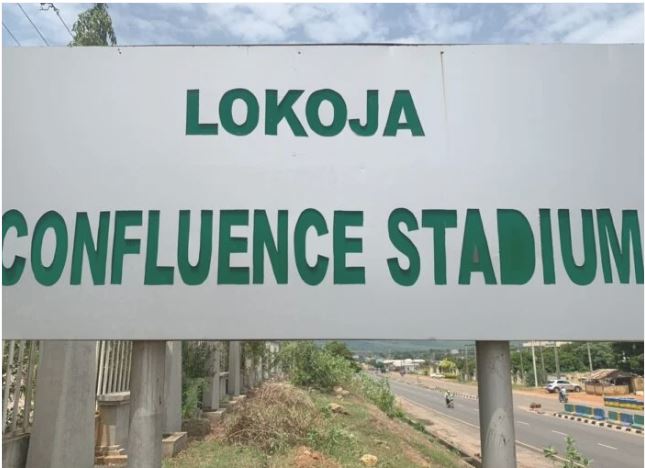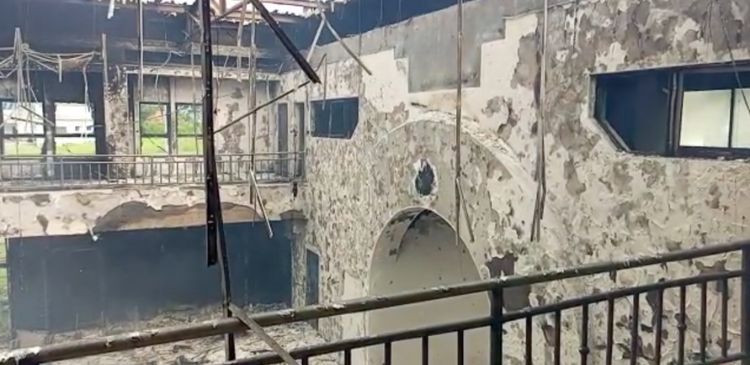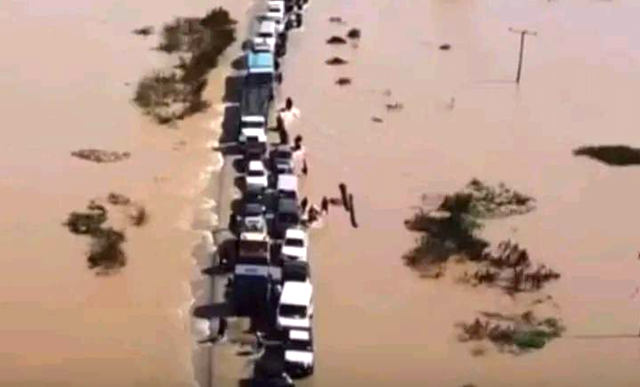Back in the day, weather forecasts were a joke. And I mean literally. The weather forecast segment which used to come at the end of the news bulletin on Nigeria’s national broadcaster, NTA, was the butt of cruel jokes amongst folks.
Often when the forecasters said it would rain, we said they meant the opposite. Seven out of 10 times, we were right; and the other three times, it drizzled on one side of the street and was stone dry on the other. That was in the early 1970s and 1980s when either as a result of poor predictive tools, limited knowledge or both, weather forecasters only did slightly better than the village rainmaker.
Times have changed. Weather forecasters do not only have better tools today, they have also become more precise and dependable. The irony is that even now that we have more dependable weather warnings we can use, we seem far less prepared for the fallouts of adverse weather.
Those who said the war foretold does not take the crippled by surprise would themselves be surprised by today’s augury. Foretold rains meet both the crippled and the whole in such an alarming state of unpreparedness that when the storm is over, neither is better off. And that is, in spite of the obvious advantages of early warning systems.
After recent flood-related disasters left about 500 dead, 1.5 million (larger than the population of the Vatican City) displaced in 27 states and property worth billions of naira destroyed, the Nigerian Meteorological Agency (NiMet), is warning that the worst is yet to come.
That is frightening. To think that after catastrophic floods left Koton-Karfe, Lokoja, in Nigeria’s North Central a miserable wretch, with scores of houses submerged and major roads impassable, that the worst is yet to come, is very, very serious.
To think that floods that wrecked Olam Farm’s 52km long dykes and damaged an estimated $20million worth of assets at what is easily Nigeria’s largest private farming enterprise might not be the end of the wrecking weather ball, is truly frightening. And we’re not even talking about the damage to small-farm holders whose livelihoods have also been washed away!
Yet, there’s a spooky sense in which it is true that neither the devastation already recorded nor NiMet’s warning may be the worst thing to happen. The real tragedy is the helplessness of millions of vulnerable people in communities that would be affected, their fate infinitely worsened by the indifference of a political elite too distracted by politics, to pay more than lip service to the looming disaster.
It’s a distraction fed by a false sense of security, the opposite of enlightened self-interest. Nigeria’s elite doesn’t travel by road. They are too frightened by the poor state of inter-state roads, by insecurity or both, to dare.
In a country ranked 37th in the world by landmass, yet with only 15 percent motorable road network, the phobia for road travel is worse in the rainy season. But it really doesn’t matter to the elite. Even if the whole country is flooded and the roads broken – as we saw in Lokoja last week – they would still build a helipad on Noah’s ark. The only thing possibly worse than NiMet’s warning is this out-of-touch elite.
I know folks who spent two days last week travelling from Lagos to Abuja by road, a journey of 10 hours or so, even in the worst of times. In the afternoon when they managed to get to Lokoja (normally three hours to Abuja) they couldn’t find a way: They were stuck in a gridlock.
After a listless four-hour wait, during which they weighed and ruled out the option of a two-hour ferry ride to the other side because of fear of banditry and scarcity of petrol, the travellers managed to find their way back to Ajaokuta and slept there. The trip to Abuja the next day was through Otukpo and other Benue villages to Nasarawa and then finally, to Abuja!
That was only one of the many tales of misery from the current floods. A woman who lives in Mpape, an Abuja suburb, shared this story on a group platform this week: “I’ve always read about and watched people’s houses flooded…they lose their stuff and become homeless, but I never thought I could experience it.
“I left home to see a friend who came (to Abuja) for her father-in-law’s funeral this afternoon only to be told by my neighbours that I should start rushing home. Met the house behind mine collapsed, our gate uprooted and my house and stuff flooded. Just finished getting what I could now. Please if you know someone who has a BQ to let in Abuja…”
I do. Most of them live in Asokoro, Maitama, Guzappe, and such areas unlikely to experience floods in a million years. Not that it’s a bad thing to live in such leafy neighbourhoods if you can afford it. In Nigeria, however, these areas are crime scenes inhabited by elites who should do something with NiMet’s warning for the safety of the vast majority, but who choose to do absolutely nothing about it.
Part of the reason for the scarcity of petrol in Abuja for most of last week was that tankers, laden with products for Abuja and parts of the North, were stranded in the Lokoja floods. But it wasn’t big news because the elite would pay for petrol whatever the cost or avoid road nuisance completely by flying.
It wasn’t just petrol or farms that were impacted by the floods, which could have been better managed if NiMet’s warning sign meant anything to the government. The food supply chain was ruined, too.
According to a report in LEADERSHIP on Sunday, a trailer driver, Ismail Mohammed, who had spent three days on the Bida-Lapai-Suleja Road, which is supposed to be an alternative to the Lokoja Road, said, “The situation is so bad…you can see me slaughtering my cow, the tenth one in three days.” This waste for a country already in the throes of climate and insecurity-induced shortages, was symptomatic of what happened up and down the food chain following the flood chaos.
What was not in short supply, however, were condolence messages by government officials and promises of emergency relief, which if it arrives at all, would be late and depleted by theft. If you underestimate the capacity of government officials to profit from citizens’ misery, ask Saudi Arabia what happened to the 200 tonnes of dates that the kingdom supplied to Boko Haram victims in IDP camps to break their fast during the 2017 Ramadan.
But that’s a story for another day. My concern here is: what is the use of NiMet’s early warning if vulnerable citizens would still suffer large-scale losses, some of them irrecoverable? NiMet warnings did not start today. In February, the service issued a warning of impending significant floods in North-Central states and also in the South-Eastern and South-Western regions of the country.
The warnings fell on deaf ears. Not for the first time, of course. Before climate problems compounded the situation along the Niger-Benue River, the tug-of-war between Nigeria and Cameroon over the latter’s Lagdo Dam had been a clear and present danger.
Whenever excess water is released from the dam as was the case in September, for example, Benue, Adamawa, Taraba, Anambra and Nasarawa States are seriously impacted. The damage in 2012, said to have been the worst in 40 years, was estimated by the National Emergency Management Agency (NEMA) at N2.6 trillion.
Nigeria was supposed to build the Dasin Hausa Dam (more than double the size of Lagdo) in Adamawa State to absorb the overflow, generate 300megawatts of electricity and irrigate thousands of hectares of land. That was in 1982. As you read this article, the Dasin dam is still uncompleted – a failure of leadership that makes natural disasters a child’s play.
It’s easy to say floods have receded and we can get on with our lives once again. Or to say, well, weather changes are now inevitable and we must learn to live with them, as if the predations of an incompetent government are the most natural thing.
For hundreds whose lives and businesses have been ruined by the government’s malicious negligence, the floods are, I’m afraid, not over yet! We are not even talking about the unpredictable aftermath: possible outbreak of diseases like cholera and dysentery; polluted water sources; compromised infrastructure, and so on!
Decades after we made fun of weather forecasters, the cruel joke is now on us: Between rising incidents of natural disasters and disasters in human form in the corridors of power, it’s hard to tell which is more devastating. And that, believe me, is not funny!
Ishiekwene is Editor-In-Chief of LEADERSHIP








![Just In: Fire razes Kogi House of Assembly [Photos/Video]](https://thenewsguru.ng/wp-content/uploads/2020/07/fire.jpg)



